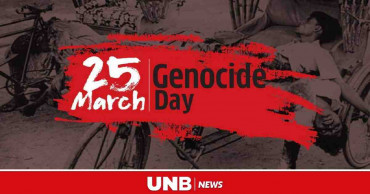March 25
Recognise March 25 as International Genocide Day: PM urges UN
Prime Minister Sheikh Hasina on Saturday urged all international community including the United Nations to recognise March 25 as the International Genocide Day.
“Internationally we want that …March 25 will get recognition as the International Genocide Day,” she said.
The Prime Minister said this while delivering her introductory speech in the Awami League Parliamentary Board (ALPB) meeting at her official residence Ganabhaban.
On the night of March 25 in 1971, the Pakistani military junta resorted to mass killings and arson in Dhaka to implement their blueprint to thwart Awami League assuming office following its victory in the 1970 election.
The night also witnessed Bangabandhu Sheikh Mujibur Rahman’s proclamation of independence before he was arrested by the Pakistani troops and subsequently taken to West Pakistan.
The Prime Minister said that Bangladesh had started its journey with this “wound (genocide).”
Read more: Why hasn’t the UN recognised 1971 Bangladesh Genocide yet?
She mentioned that Pakistani occupational forces had committed genocide over unarmed Bengalis.
“They unleashed attacks on the people of Bangladesh in a horrific way and killed people for long nine months,” she said.
In this connection, the Awami League chief said that some 30 lakh people embraced martyrdom, three crore people were forcibly became homeless.
“They torched homes and one crore people took shelter in India as refugee,” she said.
She said that there were dead bodies on the roads, bodies were eaten by jackals and dogs, and the people of the country saw that.
“There was inhumane oppression on women, they were taken to the army camps,” she added.
The Prime Minister said that Father of the nation had built a country ravaged by the war.
“We also got the recognition as the least developed country during his three years and seven months tenure. It was unfortunate that the father of the nation was killed brutally.”
She said that blood of the martyrs would never go in vain.
“Our Independence that we got in exchange of millions of martyrs, we have attained the status of developing country, we want to build Bangladesh as a developed and prosperous country. It is our pledge to millions of martyrs and to our father of the nation Bangabandhu Sheikh Mujibur Rahman,” she vowed.
Read more: Genocide Day to be observed on Saturday
In the attack on March 25, 1971 dubbed 'Operation Searchlight', the Pakistani forces mercilessly killed Bangalee members of the East Pakistan Rifles and police, students, teachers and common people.
They killed people indiscriminately, set houses on fire and looted business establishments, leaving a trail of destruction.
The day is being observed as Genocide Day officially for the seventh time in the country since the parliament unanimously adopted a resolution on March 11, 2017.
2 years ago
Voice for genocide’s global recognition rings throughout Bangladesh
More than 1,500 anti-war crimes campaigners in Bangladesh took to the streets to press home their demand for getting the recognition of March 25 as the international genocide day by the United Nations.
Professionals, including university teachers, journalists, lawyers, writers, doctors, engineers among others, took part in as many as 34 different protest rallies simultaneously on Thursday evening on university campuses, in front of press clubs, and at the bases of shaheed Minars across the country.
Also read: PM urges global leaders to take action to prevent recurrence of any future genocide
Under the banner of One Bangladesh, a platform consisting of pro-liberation professionals, the protesters carried posters that read “UN should recognise March 25 as international genocide day”, “We demand an official apology from Pakistan”, and “Dear Pakistan, stop spreading smears against 1971 war crimes”.
Wearing masks and maintaining health protocols amid the coronavirus pandemic, the demonstrators also lit candles commemorating 3 million martyrs and hundreds of thousands of women violated by Pakistani occupation forces during the nine-month Liberation War of Bangladesh in 1971.
Read Mission in New Delhi observes Genocide Day
4 years ago
50 years of Bangladesh Genocide commemorated in London calling for int'l recognition
Bangladesh High Commission in London in collaboration with Centre for Genocide Studies of the Dhaka University observed 50 years of Bangladesh Genocide calling for international recognition of the genocide and mass killings of Bangalees by the invading Pakistan army fifty years ago on March 25, 1971.
Bangladesh High Commissioner to the United Kingdom and Ireland Saida Muna Tasneem chaired the commemorative event titled “1971 Bangladesh Genocide and International Recognition.”
Dr Rounaq Jahan, professor of international affairs and senior research scholar at the Columbia University, also an eyewitness of 25 March 1971, presented a comparative narrative of contemporary genocides since the Second World War, international legal jurisprudence and legal opinions on the recognition of the Bangladesh genocide of 1971.
Also read: Resolution marking 50th anniversary of Bangladesh’s independence introduced in US House
International genocides and war crimes experts, including Professor Joann Digeorge-Lutz, Head of the Department of Liberal Studies of Texas A&M University, Yasmin Saikia, Professor of History and Hardt-Nickachos Chair in Peace Studies of Arizona State University and Dr Sachi Dastagir, professor of State University of New York College and Chair, Indian Subcontinent partition documentation project speaking as panelists recommended a number of strategies used by genocide victims such as Rwanda, Bosnia and Cambodia which could create greater awareness about their genocide atrocities.
Dr Mizanur Rahman, Research Director of Bangladesh Institute of International Affairs and former chairman of the National Human Right Commission, Dr Imitaz Ahmed, professor of the International Relations and Director of Centre for Genocide Studies of the Dhaka University, Sultan Mahmud Sharif, a leading organiser of Bangladesh Liberation War in the UK, freedom fighter Dewan Gaus Sultan and Dr Nuzhat Chowdhury, daughter of 1971 martyr intellectual Dr Alim Chowdhury also spoke as panelists.
On the occasion of the 50th anniversary celebration of Bangladesh’s glorious independence inspired by the theme ‘The Eternal Mujib’ Bangladesh High Commission London paid deep homage to the 3 million victims and 200,000 Biranganas of the 1971 genocide committed on the soil of Bangladesh during 1971 War of Liberation.
Also read: 50th Years of Independence: Queen Elizabeth greets Bangladeshis
Expressing her gratitude to Prime Minister Sheikh Hasina for declaring 25 March as the Bangladesh Genocide Day, High Commissioner Saida Muna Tasneem said, “The government headed by Prime Minister Sheikh Hasina started the 1971 war crimes trials through the independent International Crimes Tribunal, Bangladesh. It is now the responsibility of our generation to create global awareness about international recognition of the 1971 Bangladesh genocide and prevent genocide never happens anywhere else.”
The High Commissioner said the massacre of 1971 is in no way less significant than those in Cambodia, Bosnia, Rwanda and the former Yugoslavia; and pledged to create greater awareness on Bangladesh genocide amongst British political, humanitarian and think-tank circles and said today’s event is part of the effort.
Dr Mizanur Rhaman spoke on international legal provisions for recognition of Bangladesh genocide of 1971 and said that the recognition of Bangladesh genocide is indispensable for sake of justice.
Dr Imitaz Ahmed said Bangladesh 1971 genocide should get international recognition as the mass killing on 25 March and the following months was intended to destroy the entire Bengalee nation.
Dr Nuzhat Chowdhury described the brutal intellectual killings on 14 December 1971 and demanded an unconditional apology from the Pakistan army and their collaborators.
Earlier, messages from the President and Prime Minister on the Day were read out and special prayers were offered, seeking eternal peace for Bangabandhu Sheikh Mujibur Rahman, his martyred families, the martyrs of March 25 and the glorious liberation war.
Also read: Pakistani war criminals should be brought under trial: Envoy
A one-minute silence was observed in honour of the martyrs of 71 Genocide.
A documentary on the genocide was also screened. Dedicating to the 1971 martyrs, Political Counsellor Dewan Mahmudul Haque recited a famous poem of eminent poet Shamsur Rahman.
Members of the British-Bangladeshi diaspora joined the virtual event and paid their profound respects to the Father of the Nation and the martyrs killed on March 25 genocide and during the nine-month glorious liberation war.
4 years ago
One-Min blackout to mark Genocide Day
A one-minute blackout will be observed in Bangladesh on Thursday night to mark 'Genocide Day', amid fears of a second wave of the Covid pandemic.
On the black night of March 25 in 1971, the Pakistani military junta resorted to mass killings in Dhaka to implement its blueprint to thwart the Awami League's assumption of office following the election mandate of 1970.
Also read: Trial of Pakistan's 1971 Genocide: It's for Bangladesh to decide
In the attack dubbed 'Operation Searchlight', the Pakistani security forces mercilessly killed nearly three million people -- Bangali members of the East Pakistan Rifles and police, students, teachers and common people. The Pakistani forces also set thousands of properties on fire and looted business establishments.
This is the third time that Bangladesh is observing Genocide Day since Parliament unanimously adopted a resolution on March 11, 2017.
This year, however, there will be no outdoor programme due to the prevailing Covid situation. Only a one-minute blackout is slated to be observed from 9pm to 9.01pm across the country.
President Abdul Hamid and Prime Minister Sheikh Hasina have already issued separate messages on the occasion.
Also read: One minute ‘blackout’ at 9 pm on March 25 night
In her message, the Prime Minister said, “On the occasion of the 50th anniversary of the Day of Genocide, we pledge to uphold the freedom that we have earned in exchange for the three million martyrs and the respect of two hundred thousand tortured mothers and sisters, if necessary, in exchange for our supreme sacrifices.”
“Resisting all immediate conspiracies and be inspired by the spirit of the Great Liberation War, we shall play a concerted role in the realisation of the dream of the Father of the Nation for building a non-communal, hunger-free and prosperous Bangladesh, Insha Allah," she said.
“I wish all-out success to the programmes taken on the occasion of 'Genocide Day'," the PM said.
President Hamid said, “On the eve of the birth centenary of the Father of the Nation and the Golden Jubilee of Independence, I call upon all, irrespective of party affiliation, to contribute from their respective positions in the implementation of these programmes.”
Also read: Genocide Day' observed
“We can pay our eternal respect to every soul who gave his life in 1971 genocide, by turning the country into the ‘Sonar Bangla’ as dreamt by Bangabandhu,” he said.
4 years ago
Coronavirus: PM to address nation March 25
Prime Minister Sheikh Hasina will brief the nation on the overall coronavirus situation in the country on March 25, Road, Transport and Bridges Minister Obaidul Quader said Monday.
5 years ago
One-minute ‘blackout’ to mark Genocide Day on March 25: Minister
For the fourth successive year, the government has decided to observe a minute’s 'blackout' programme on the night of March 25, marking the 'Genocide Day'.
5 years ago

.jpg)
.jpg)

.jpg)


